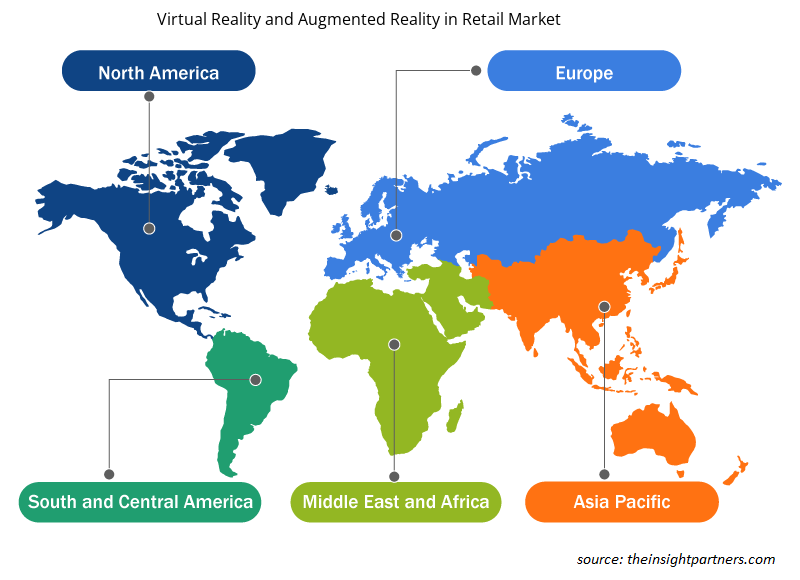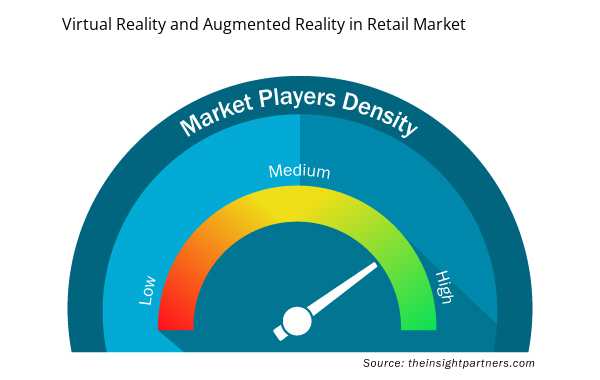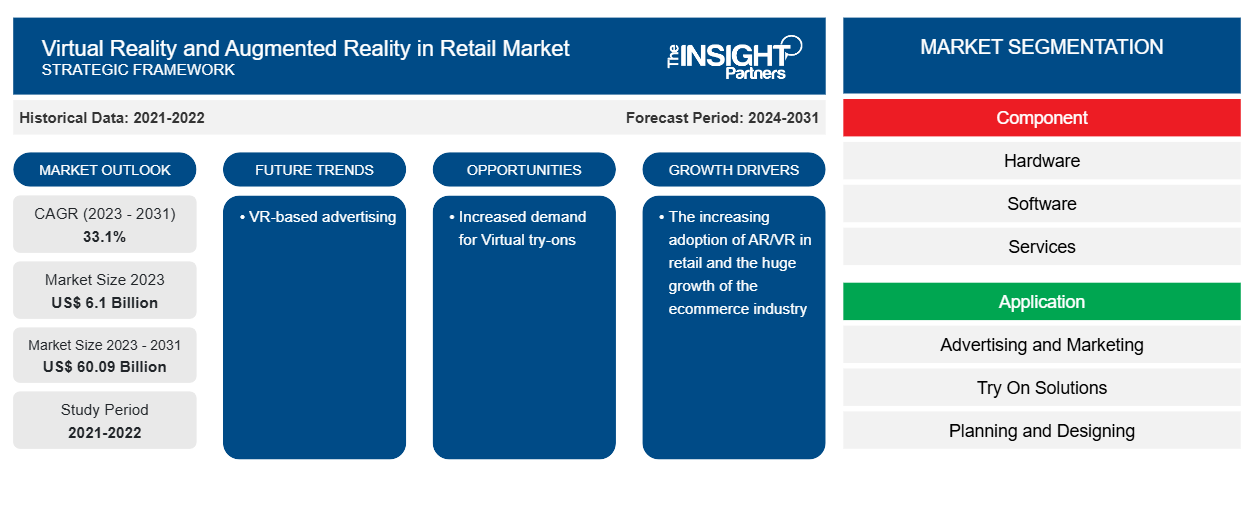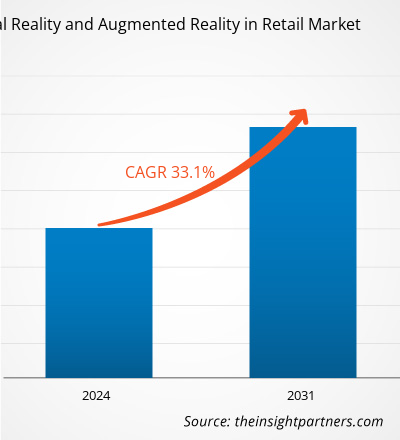小売業における仮想現実と拡張現実の規模は、2023年の61億米ドルから2031年には600.9億米ドルに達すると予測されています。小売市場における仮想現実と拡張現実は、2023年から2031年の間に33.1%のCAGRを記録すると予想されています。VRベースの広告は、引き続き市場の重要なトレンドであり続けると思われます。
小売市場分析における仮想現実と拡張現実
小売業における仮想現実と拡張現実には、現在の市場動向と予測期間中の予測可能な影響により、成長の見通しがあります。小売業における仮想現実と拡張現実は、小売業における AR/ VRの採用の増加や電子商取引業界の大幅な成長などの要因により成長しています。仮想試着の需要の増加は、小売業における仮想現実と拡張現実に有利な機会を提供します。
小売市場における仮想現実と拡張現実の概要
仮想現実 ( VR ) と拡張現実 (AR) は、没入型でインタラクティブなショッピング体験を提供することで、小売業界を変革しています。VRは、顧客が仮想店舗を探索したり、製品を 3D で視覚化したり、仮想的に衣服を試着したりできる完全なデジタル環境を作り出します。一方、AR はデジタル情報を現実世界に重ね合わせ、スマートフォン アプリやスマート ミラーを使用して、家具を自宅でどのように見せるか、メイクを顔に施すとどのように見えるかを確認できます。これらのテクノロジにより、小売業者はオンライン ショッピングと店舗でのショッピングのギャップを埋め、製品の視覚化を強化し、返品を減らし、顧客エンゲージメントと売上を促進できる魅力的なブランド体験を生み出すことができます。
要件に合わせてレポートをカスタマイズする
このレポートの一部、国レベルの分析、Excelデータパックなど、あらゆるレポートを無料でカスタマイズできます。また、スタートアップや大学向けのお得なオファーや割引もご利用いただけます。
- このレポートの主要な市場動向を入手してください。この無料サンプルには、市場動向から見積もりや予測に至るまでのデータ分析が含まれます。
小売市場における仮想現実と拡張現実の推進要因と機会
小売業におけるAR/ VRの導入増加が市場を有利に導く
デジタル時代が影響を与えている主な分野の 1 つが小売業です。ウォルマート、アリババ、アマゾンなどの最大手小売業者は、より個別化されたインタラクティブなサービスを顧客に提供するために、最先端の小売技術に積極的に投資しています。スマート小売の 3 つの基本要素は、利便性の向上、パーソナライゼーション、カスタマイズです。AR や VR を活用したアプリケーションなどの革新的なソリューションの人気が高まっています。Wayfair、Lowe's、Ikeaなどの小売大手に続いて、多くの小売企業が AR/ VR技術を採用し始めています。たとえば、10 億人以上が拡張現実製品を使用すると予想されています。その数は驚異的です。仮想現実と拡張現実により、顧客は購入前に商品を特定して試すことが容易になります。拡張現実の使用により、巨大なショッピング モールのナビゲーションが容易になります。
バーチャル試着の需要増加
バーチャル試着の需要増加は、小売市場の成長においてVRと ARに大きなチャンスをもたらします。バーチャル試着は、顧客が購入前に製品をより正確に視覚化できるようにすることで、返品率を大幅に削減できます。これにより、小売業者は配送と補充にかかる費用を節約し、収益性を向上させます。さらに、顧客はバーチャル試着を通じてオンライン購入に自信を持つようになるため、実際に商品を見ずに購入する可能性が高くなります。これにより、特に衣料品や化粧品などのカテゴリーで、e コマースの売上を伸ばすことができます。バーチャル試着は、顧客エンゲージメントと満足度を高めることができる、斬新でインタラクティブなショッピング体験を提供します。これにより、ブランドロイヤルティとリピート購入が向上します。
小売市場レポートのセグメント分析における仮想現実と拡張現実
小売市場分析における仮想現実と拡張現実の導出に貢献した主要なセグメントは、コンポーネント、アプリケーション、小売タイプです。
- 小売市場における仮想現実と拡張現実は、構成要素に基づいて、ハードウェア、ソフトウェア、サービスに分けられます。ハードウェアセグメントは、2023年に大きな市場シェアを占めるでしょう。
- 用途別に見ると、市場は広告とマーケティング、試着ソリューション、企画と設計、その他に分類されています。2023年には広告とマーケティングのセグメントが最大の市場シェアを占めました。
- 小売タイプ別に見ると、市場はジュエリー、アパレル、美容・化粧品、家具、その他に分類されています。2023年にはアパレル部門が最大の市場シェアを占めました。
小売市場における仮想現実と拡張現実の地域別シェア分析
小売市場レポートにおける仮想現実と拡張現実の地理的範囲は、主に北米、アジア太平洋、ヨーロッパ、中東およびアフリカ、南米および中米の 5 つの地域に分かれています。
アジア太平洋地域の小売業では、拡張現実 (AR) と仮想現実 ( VR )の利用が広がりつつあります。これらの技術は、小売体験を向上させ、顧客エンゲージメントを促進するために、さまざまな方法でますます活用されています。これらの技術は、小売体験を向上させ、顧客エンゲージメントを促進し、業界のマーケティング、トレーニング、教育に新たな機会を提供する可能性を秘めています。
小売市場における仮想現実と拡張現実の地域分析
予測期間を通じて小売市場における仮想現実と拡張現実に影響を与える地域的な傾向と要因は、Insight Partners のアナリストによって徹底的に説明されています。このセクションでは、北米、ヨーロッパ、アジア太平洋、中東、アフリカ、南米、中米にわたる小売市場における仮想現実と拡張現実のセグメントと地理についても説明します。

- 小売市場における仮想現実と拡張現実の地域別データを入手
小売市場における仮想現実と拡張現実レポートの範囲
| レポート属性 | 詳細 |
|---|---|
| 2023年の市場規模 | 61億米ドル |
| 2031年までの市場規模 | 600.9億米ドル |
| 世界のCAGR(2023年~2031年) | 33.1% |
| 履歴データ | 2021-2022 |
| 予測期間 | 2024-2031 |
| 対象セグメント | コンポーネント別
|
| 対象地域と国 | 北米
|
| 市場リーダーと主要企業プロフィール |
|
小売市場における仮想現実と拡張現実の密度:ビジネスダイナミクスへの影響を理解する
小売市場における仮想現実と拡張現実は、消費者の嗜好の変化、技術の進歩、製品の利点に対する認識の高まりなどの要因により、エンドユーザーの需要が高まり、急速に成長しています。需要が高まるにつれて、企業は提供を拡大し、消費者のニーズを満たすために革新し、新たなトレンドを活用し、市場の成長をさらに促進しています。
市場プレーヤー密度とは、特定の市場または業界内で活動している企業または会社の分布を指します。これは、特定の市場スペースに、その市場規模または総市場価値に対してどれだけの競合相手 (市場プレーヤー) が存在するかを示します。
小売市場における仮想現実および拡張現実で事業を展開している主要企業は次のとおりです。
- エプソンアメリカ株式会社
- マルクセント
- グーグル
- インフォシス株式会社
- インテルコーポレーション
- マイクロソフト株式会社
免責事項:上記の企業は、特定の順序でランク付けされていません。

- 小売市場における仮想現実と拡張現実のトップキープレーヤーの概要を入手
小売市場における仮想現実と拡張現実のニュースと最近の動向
小売市場における仮想現実と拡張現実は、主要な企業出版物、協会データ、データベースなどの一次調査と二次調査後の定性的および定量的データを収集することによって評価されます。小売市場における仮想現実と拡張現実の発展のいくつかを以下に示します。
- Apple は、600 の新しいアプリとゲームを備えた初の複合現実ヘッドセット Vision Pro をリリースしました。その中には、大手小売業者による拡張現実 (AR) と仮想現実 (VR) への進出があり、消費者によりインタラクティブな e コマース体験を提供できる能力を活用しています。Vision Pro アプリは、ヘッドセット ユーザーに 3D ショッピング体験を提供し、製品を閲覧したり、衣装を組み立てたりできるようにします。さらに、FaceTime ビデオ通話用の Apple SharePlay 機能を統合することで、小売業者はこのリアルな環境でスタイリストからリアルタイムのアドバイスを提供できます。(出典: Apple、プレスリリース、2024 年 2 月)
- Zero10 は、トミー ヒルフィガーやコーチなどのブランドに、店内やウィンドウディスプレイを活用した AR ミラーによるデジタル ソリューションを提供しています。トミー ヒルフィガーは、ヨーロッパでテクノロジー企業 Zero10 の AR ミラーをショーン メンデス キャンペーンの一環として、また最近発売されたパファー ジャケットのプロモーションに使用しています。一方、コーチは、タビー バッグやホリデー シーズン キャンペーンの宣伝に Zero10 の AR ミラーと AR ストアフロントを採用しています (出典: Zero10、プレスリリース、2024 年 4 月)
小売市場における仮想現実と拡張現実レポートの対象範囲と成果物
「小売市場における仮想現実と拡張現実の市場規模と予測(2021〜2031年)」レポートでは、以下の分野をカバーする市場の詳細な分析を提供しています。
- 対象範囲に含まれるすべての主要市場セグメントについて、小売市場における仮想現実と拡張現実の規模と世界、地域、国レベルでの予測
- 小売市場における仮想現実と拡張現実の動向、および推進要因、制約、主要な機会などの市場動向
- 詳細なPEST/ポーターの5つの力とSWOT分析
- 主要な市場動向、世界および地域の枠組み、主要プレーヤー、規制、最近の市場動向を網羅した小売市場分析における仮想現実と拡張現実
- 市場集中、ヒートマップ分析、主要プレーヤー、小売市場における仮想現実と拡張現実の最近の動向を網羅した業界の状況と競争分析
- 詳細な企業プロフィール
- 過去2年間の分析、基準年、CAGRによる予測(7年間)
- PEST分析とSWOT分析
- 市場規模価値/数量 - 世界、地域、国
- 業界と競争環境
- Excel データセット



Report Coverage
Revenue forecast, Company Analysis, Industry landscape, Growth factors, and Trends

Segment Covered
This text is related
to segments covered.

Regional Scope
North America, Europe, Asia Pacific, Middle East & Africa, South & Central America

Country Scope
This text is related
to country scope.
よくある質問
North America is expected to dominate the virtual reality and augmented reality in the retail market with the highest market share in 2023.
The virtual reality and augmented reality in retail market size is projected to reach US$ 60.09 billion by 2031.
The leading players operating in the virtual reality and augmented reality in the retail market are Epson America, Inc.; Marxent; Google LLC; Infosys Ltd; Intel Corporation; Microsoft Corporation; PTC Inc.; Qualcomm Technologies, Inc.; Retail VR
VR-based advertising is anticipated to play a significant role in the global virtual reality and augmented reality retail market in the coming years.
Increasing adoption of AR/VR in retail and the huge growth of the ecommerce industry are the major factors driving virtual reality and augmented reality in the retail market.
The global virtual reality and augmented reality in the retail market is expected to grow at a CAGR of 33.1% during the forecast period 2024 - 2031.
Trends and growth analysis reports related to Technology, Media and Telecommunications : READ MORE..
The Insight Partners performs research in 4 major stages: Data Collection & Secondary Research, Primary Research, Data Analysis and Data Triangulation & Final Review.
- Data Collection and Secondary Research:
As a market research and consulting firm operating from a decade, we have published and advised several client across the globe. First step for any study will start with an assessment of currently available data and insights from existing reports. Further, historical and current market information is collected from Investor Presentations, Annual Reports, SEC Filings, etc., and other information related to company’s performance and market positioning are gathered from Paid Databases (Factiva, Hoovers, and Reuters) and various other publications available in public domain.
Several associations trade associates, technical forums, institutes, societies and organization are accessed to gain technical as well as market related insights through their publications such as research papers, blogs and press releases related to the studies are referred to get cues about the market. Further, white papers, journals, magazines, and other news articles published in last 3 years are scrutinized and analyzed to understand the current market trends.
- Primary Research:
The primarily interview analysis comprise of data obtained from industry participants interview and answers to survey questions gathered by in-house primary team.
For primary research, interviews are conducted with industry experts/CEOs/Marketing Managers/VPs/Subject Matter Experts from both demand and supply side to get a 360-degree view of the market. The primary team conducts several interviews based on the complexity of the markets to understand the various market trends and dynamics which makes research more credible and precise.
A typical research interview fulfils the following functions:
- Provides first-hand information on the market size, market trends, growth trends, competitive landscape, and outlook
- Validates and strengthens in-house secondary research findings
- Develops the analysis team’s expertise and market understanding
Primary research involves email interactions and telephone interviews for each market, category, segment, and sub-segment across geographies. The participants who typically take part in such a process include, but are not limited to:
- Industry participants: VPs, business development managers, market intelligence managers and national sales managers
- Outside experts: Valuation experts, research analysts and key opinion leaders specializing in the electronics and semiconductor industry.
Below is the breakup of our primary respondents by company, designation, and region:

Once we receive the confirmation from primary research sources or primary respondents, we finalize the base year market estimation and forecast the data as per the macroeconomic and microeconomic factors assessed during data collection.
- Data Analysis:
Once data is validated through both secondary as well as primary respondents, we finalize the market estimations by hypothesis formulation and factor analysis at regional and country level.
- Macro-Economic Factor Analysis:
We analyse macroeconomic indicators such the gross domestic product (GDP), increase in the demand for goods and services across industries, technological advancement, regional economic growth, governmental policies, the influence of COVID-19, PEST analysis, and other aspects. This analysis aids in setting benchmarks for various nations/regions and approximating market splits. Additionally, the general trend of the aforementioned components aid in determining the market's development possibilities.
- Country Level Data:
Various factors that are especially aligned to the country are taken into account to determine the market size for a certain area and country, including the presence of vendors, such as headquarters and offices, the country's GDP, demand patterns, and industry growth. To comprehend the market dynamics for the nation, a number of growth variables, inhibitors, application areas, and current market trends are researched. The aforementioned elements aid in determining the country's overall market's growth potential.
- Company Profile:
The “Table of Contents” is formulated by listing and analyzing more than 25 - 30 companies operating in the market ecosystem across geographies. However, we profile only 10 companies as a standard practice in our syndicate reports. These 10 companies comprise leading, emerging, and regional players. Nonetheless, our analysis is not restricted to the 10 listed companies, we also analyze other companies present in the market to develop a holistic view and understand the prevailing trends. The “Company Profiles” section in the report covers key facts, business description, products & services, financial information, SWOT analysis, and key developments. The financial information presented is extracted from the annual reports and official documents of the publicly listed companies. Upon collecting the information for the sections of respective companies, we verify them via various primary sources and then compile the data in respective company profiles. The company level information helps us in deriving the base number as well as in forecasting the market size.
- Developing Base Number:
Aggregation of sales statistics (2020-2022) and macro-economic factor, and other secondary and primary research insights are utilized to arrive at base number and related market shares for 2022. The data gaps are identified in this step and relevant market data is analyzed, collected from paid primary interviews or databases. On finalizing the base year market size, forecasts are developed on the basis of macro-economic, industry and market growth factors and company level analysis.
- Data Triangulation and Final Review:
The market findings and base year market size calculations are validated from supply as well as demand side. Demand side validations are based on macro-economic factor analysis and benchmarks for respective regions and countries. In case of supply side validations, revenues of major companies are estimated (in case not available) based on industry benchmark, approximate number of employees, product portfolio, and primary interviews revenues are gathered. Further revenue from target product/service segment is assessed to avoid overshooting of market statistics. In case of heavy deviations between supply and demand side values, all thes steps are repeated to achieve synchronization.
We follow an iterative model, wherein we share our research findings with Subject Matter Experts (SME’s) and Key Opinion Leaders (KOLs) until consensus view of the market is not formulated – this model negates any drastic deviation in the opinions of experts. Only validated and universally acceptable research findings are quoted in our reports.
We have important check points that we use to validate our research findings – which we call – data triangulation, where we validate the information, we generate from secondary sources with primary interviews and then we re-validate with our internal data bases and Subject matter experts. This comprehensive model enables us to deliver high quality, reliable data in shortest possible time.


 このレポートの無料サンプルを入手する
このレポートの無料サンプルを入手する